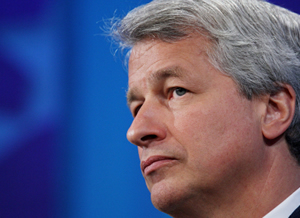
What will JPMorgan’s trading goof mean for regulation?
 Much has been made of the trading mishap at JPMorgan Chase & Co.’s London office, resulting in current estimates of a $3 billion loss to the company or more. But what is at stake here is not so much JPMorgan’s financial health, which doesn’t appear in question, but future regulation of the financial sector.
Much has been made of the trading mishap at JPMorgan Chase & Co.’s London office, resulting in current estimates of a $3 billion loss to the company or more. But what is at stake here is not so much JPMorgan’s financial health, which doesn’t appear in question, but future regulation of the financial sector.
JPMorgan CEO Jamie Dimon has been arguing publicly against certain kinds of regulation, including the Volcker rule, which would limit proprietary trading by the big banks.
“I think it’s unnecessary, especially when you add it on top of all the other [regulation],’’ Dimon reiterated this week before a U.S. Senate committee, where he spent two hours explaining his company’s trading mistake.
Welcome to the new age, where big banks will have to answer questions not just from their shareholders and customers, but from Congress as to what went wrong with their business and who knew what, and when.
Critics are using JPMorgan’s trading loss, which occurred in the division that invests customer deposits, to argue the Volcker rule ought to be strict and tough on banks.
Regulators have missed 67 percent of their rulemaking deadlines in implementing the Dodd-Frank Act, according to the Davis Polk law firm. Much remains to be written that will affect companies such as JPMorgan and smaller banks as well.
That’s why the public charades are so interesting.
“In the political world, it’s going to be hard for regulators to embrace a looser process rather than a stricter process,’’ says Harold P. Reichwald, a partner in Los Angeles at the law firm Manatt, Phelps & Phillips. “This incident with JPMorgan will have the effect of creating a heightened sensitivity on the part of regulators to pressure the banks they regulate to have a more formal approach to risk management.”
Michael Klausner, a professor with the Rock Center for Corporate Governance at Stanford University, thinks the JPMorgan trading loss really shouldn’t be a regulatory concern.
“Even if you had a 50 times greater hit to capital, you’d still not have a systemic event,’’ he says. “As a policy matter, what we worry about is a systemic event, or what would have an impact on other banks.”
JPMorgan says its capital levels remain strong and it will be profitable in the second quarter, despite the loss.
Klausner says that you can make the argument that the trading loss is serious enough threaten the CEO’s job and the value of the company’s stock, but as a regulatory matter, “it’s trivial.”
But nowadays, banks such as JPMorgan are addressing their business activities to a much wider audience than shareholders.
Among Dimon’s details about what went wrong with the risk management process at the chief investment office (CIO):
- CIO’s strategy for reducing the synthetic credit portfolio [e.g. credit default swaps] was poorly conceived and vetted. The strategy was not carefully analyzed or subjected to rigorous stress testing within CIO and was not reviewed outside CIO.
- In hindsight, CIO’s traders did not have the requisite understanding of the risks they took. When the positions began to experience losses in March and early April, they incorrectly concluded that those losses were the result of anomalous and temporary market movements, and therefore were likely to reverse themselves.
- Personnel in key control roles in CIO were in transition and risk control functions were generally ineffective in challenging the judgment of CIO’s trading personnel. Risk committee structures and processes in CIO were not as formal or robust as they should have been.
- CIO, particularly the synthetic credit portfolio, should have gotten more scrutiny from both senior management and the firm-wide risk control function.
Dimon detailed the company’s response to the “incident,” which included replacing much of its top investment management team and chief risk officer for the division. It also included establishing a new risk committee just for the chief investment office.
Sen. Charles Schumer, D-New York, asked Dimon during the hearing why the risk committee of the board missed what was happening in the trading office.
“Some questions have been raised about the oversight of your risk committee,’’ he said. “Why didn’t it do its job?”
Dimon said if management didn’t catch it, then the risk committee couldn’t. That sounds reasonable, but now the risk committee must find out why it wasn’t learning about the risks that the bank was taking. Dimon said the bank will learn from its mistake. So the question is now: What will regulators make of it?


